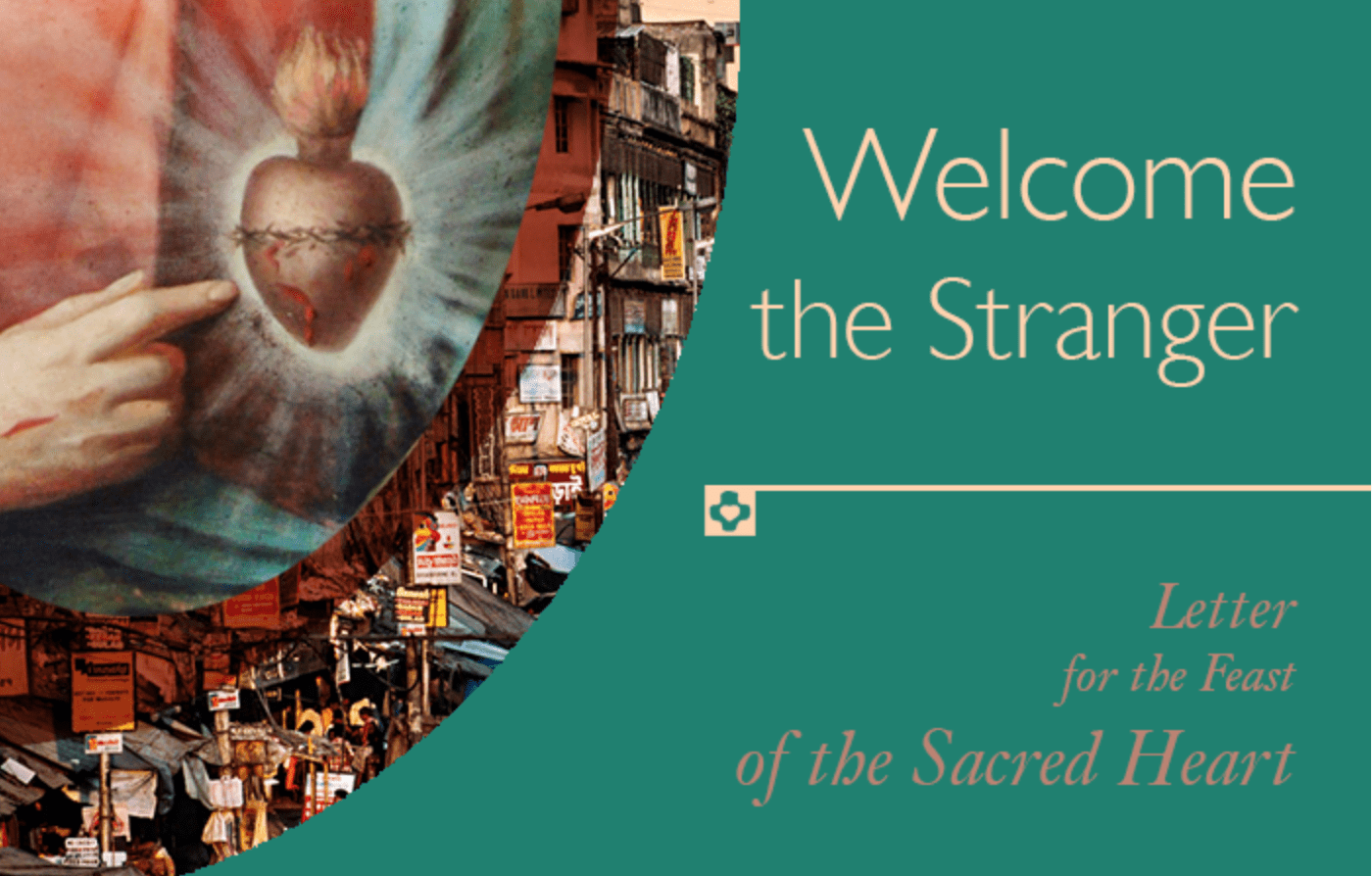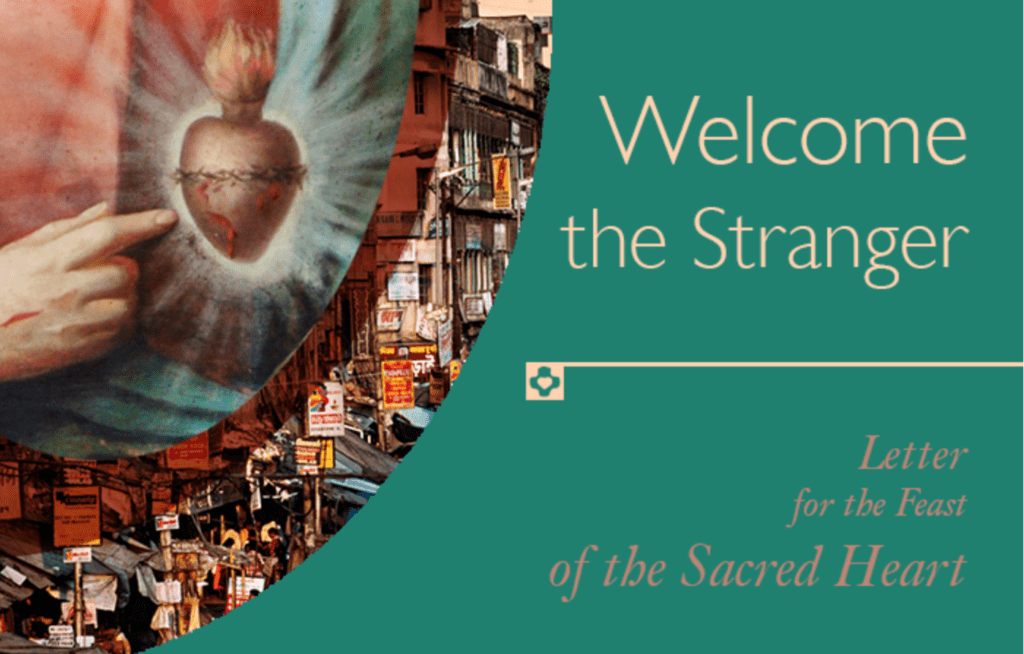
“Fr Dehon tuned up his sensitivities so as to be able to feel the heartbeat of Jesus in order to make Jesus’ heartbeat his own and to make Jesus’ vision his own,” wrote Fr. Heiner Wilmer in the General Council’s letter for the Feast of the Sacred Heart (the feast is celebrated June 3 this year). “He wanted to respond in such fashion as to be able to think like Jesus and act like him, with passion. What the Industrial Revolution meant for Fr. Dehon at the end of the 19th century is similar to what migration means for us at the beginning of the 21st century. As Dehonians we see migration as the greatest challenge of our times.”
The letter in full:
Rome, May 1, 2016
Letter for the Feast of the Sacred Heart
An encounter with a stranger
On our return from Koodal to Aluva, a city in the south of India, we stopped at a small village café just off the road. What we experienced in the area was anything but quiet: lots of activity in the road, loudspeakers, banners, singers, dancers, political party logos. We were caught up in an election campaign. The noise was incredible. After a long car trip we were tired, hungry, and thirsty. Inside the café there was some quiet and Fr. Thomas Vinod, district superior, ordered each of us a Pepsi-Cola and a cutlet – a small fried roll of vegetables, flour, and (relatively) hot spices, a snack that is very popular in Kerala.
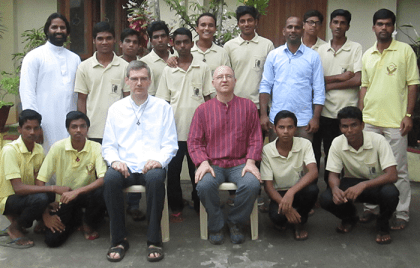
A man sat down next to me at the table, an elderly Indian, and ordered the same thing except that in place of the Pepsi he chose tea. After he had finished eating, he looked at me from head to toe and asked: “Do you play basketball?” “No, not really” I answered. “I was not very good at basketball.” We then spoke about sports in India and Germany. Later, when we Dehonians –– Fr. Thomas Vinod, Fr. Steve Huffstetter, Fr. Lenin James and I –– were leaving the establishment and heading for the car, my table friend turned toward me and pointed to the small, wooden, Dehonian cross that I wear and asked: “What is it?” “A small wooden cross” I said. “Wonderful!” he said, “you too believe in magic energy!”
Whoever travels has to expect surprises. Some leave us speechless. Travel changes a person. Contact with foreign cultures, contact with strangers, reflecting on other ideas changes us. A person becomes altered. A person becomes different. He is changed. Without such transformation, there is no life.
Migration: a sign of our times
So many encounters generate new life. This possibility in our times has been amplified because never in our history have there been so many people on the road, searching for new life, as at the outset of the 21st century. At the end of the 19th century Fr. Dehon saw himself challenged by the Industrial Revolution. Through his congregation he wished to furnish some response to the prevailing problems and needs of the time but also to the opportunities and possibilities that the Industrial Revolution offered to the people. The foundation of his response, the anchor for his reaction, lay in the devotion of the Sacred Heart. He wanted to live and act like Jesus.
Fr Dehon tuned up his sensitivities so as to be able to feel the heartbeat of Jesus in order to make Jesus’ heartbeat his own and to make Jesus’ vision his own. He wanted to respond in such fashion as to be able to think like Jesus and act like him, with passion. What the Industrial Revolution meant for Fr. Dehon at the end of the 19th century is similar to what migration means for us at the beginning of the 21st century. As Dehonians we see migration as the greatest challenge of our times.
At present in Africa, Asia, America, and Europe tens of millions of people are leaving their homes. They are moving from the countryside to the big cities, from one country to another, from one continent to another. Why? Because they are in financial difficulty, as once Abraham was when he traveled to Egypt “to live there” (Gen. 12:10) because Canaan was suffering famine. Others leave their country, not because of natural disasters, but because they are overcome by gangs and wars. Some flee because of the misery they endure and because they have been oppressed and exploited by unjust systems. In dynamic fidelity to our founder we want to be rooted in an attitude and disposition that corresponds with that of Jesus as we seek to respond to the issue of migration.
Dehonians and migration
In the coming years the congregation wants to pay special attention to the mercy of God. In the mercy of God we see the key to God’s love for humanity. “The name of God is mercy;” embodies the experience and convictions of Pope Francis.[1] In the letters we address to you, we allow ourselves to be guided by the seven corporal and spiritual works of mercy. In the letter on the occasion of Fr. Dehon’s birthday on March 14, 2016, among the spiritual works of mercy we called attention to: “patiently enduring challenging people.” In connection with this task, we now invite you to consider another corporal work of mercy: “welcome the stranger.” What does welcoming pilgrims mean for us? What does it mean for us as Dehonians to welcome the stranger and help those without homes?
Our first visitation took us to India. In the parish our confreres have near Mumbai we met migrants. Not one person was born in that suburb of a city of 25 million people. All came from other parts of India – like Abraham – with their families and their limited possessions to Mumbai for economic reasons, to make their way and to make a better life possible for themselves and for their children. On January 31, after Sunday Mass in the parish of Divine Mercy at Vasai, on the northern side of Mumbai, we were invited to speak with men and women involved in the community. We found to our surprise that not a single person of the 30 was born there. All came from different parts of India and spoke different languages:
Migrants from Kerala speak Malayalam
Migrants from Tamilnadu speak Tamil
Migrants from Andhra Pradesh speak Telugu
Migrants from Maharashtra speak Marathi or Hindi
Migrants from Goa speak Konkani or English
Migrants from Uttar Pradesh speak Hindi
Migrants from Jharkhand speak Hindi and dialects
Migrants from Odisha speak Odia
Migrants from Karnataka speak Kannada
A good command of English is found only among the educated, not with simple migrants arriving at Mumbai, most of whom can’t read. In such a situation, as in many others throughout the world, the challenge is to create real partnerships among people to support one another.
We need to offer assistance to wounded families, and rebuild broken relationships. We need to provide training to all those in physical, psychological, and spiritual need.
Interest in the other at the outset
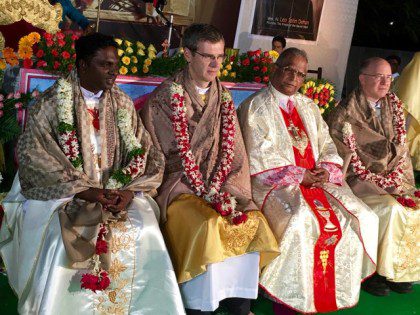
Looking at the reality we find in the various locations in which Dehonians labor, a number of questions spontaneously arise. What can we do as Priests of the Sacred Heart to meet the needs that arise from migration? How do we make the interior disposition of Jesus outwardly manifest, his view, his healing touch, his thinking, his words, and his actions? The story of the disciples at Emmaus encountering the risen Lord provides a marvelous and concrete way of seeing what it means from one point of view to be without a country and from another to welcome the stranger.
After a lengthy journey, the disciples of Emmaus are tired, hungry, and thirsty. Jesus, walking along with them, takes the initiative and asks: What’s bothering you? What is your concern? What are you discussing? The Lord, an anonymous pilgrim, shows interest in others, asking about their lives. Filled with curiosity, he hears what they have to say. They tell him the story of the cross. This interest in the existence of the other, the question about how they are doing is a premise for every authentic encounter, for every human relationship, and for every community. For our congregation and our communities as well, from the very outset there has to be an interest in the other.
Only afterwards do friends have something to say to each other and understand each other – or strangers desire to understand each other – and then sit down at a table and have a meal together. Table fellowship remains to this day a visible sign of community. Without table fellowship the Priests of the Sacred Heart “spin their wheels” and go nowhere. Without the breaking of bread on the altar with the one hand and in the other, a meal together of rice, manioc, pasta, meat or potatoes, can a true religious Dehonian life or effective hospitality and a welcome of pilgrims and strangers exist. Only at the common table can the foreigner become friend. This is the wisdom of Emmaus. Sitting down at table together, eating and drinking together, and speaking one to another about life creates closeness and trust. Everything then becomes discovery and breakthrough. There is joy over an encounter that opens us up to the newness of a story.
Talk is not enough – act as communities
In light of the historical significance of today’s refugee situation our Holy Father Francis urges religious communities to welcome migrants into their monasteries and structures. Preaching is not enough. Talking is not enough. It is a matter of providing refugees, migrants, and expatriates with a roof: shared time and space. Following through on this notion is not something new for the congregation. On the contrary, it forms part of the history of our foundation. Leo Dehon was involved in the issue of European migrants who left during the 19th century for the “New World” of Canada, the United States, Brazil, Argentina and Australia – and not just in his writings.[2] In 1913, Fr. Dehon wrote that it would be good to accompany European migrants with missionaries. Earlier (1889-1899) he was asked about creating an institute for emigrants at Clairefontaine. He spoke to the Scalabrini Fathers who were experienced in this area and who had the support of the Holy See. At a meeting held in Louvain in 1899, two options were selected for involving the Dutch confreres who were experiencing rapid growth: “initiate a school at Sittard or establish a resource center for emigrants at Rotterdam.”[3]
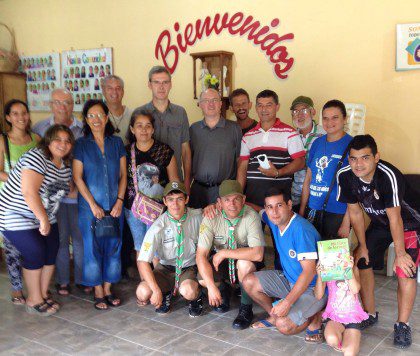
If all these elements are taken into consideration, when the Son of Man comes in glory with all the angels with him and sits in judgment on the throne of glory and asks: “What have you done for the stranger and the homeless” (Matt 25), what will we tell him? What shall we say to him as a community that seeks to be attentive to his very heartbeat? Each single confrere needs to respond, and we too as a community need to respond. Hence, on the part of the general administration, here’s what we propose:
Every province (and region and district) should have at least one project in which members are involved in a special way with migrants. Our houses should be open. Our confreres should have the time to accompany persons on their journey through life, listen to them, freed from any discrimination of social class, or caste, or race. We believe it is important that each member experience in his own skin what it is like to be a foreigner, to be a stranger among strangers. Among other things and related to this proposal we believe everyone should learn a different language, and, after consultation with his major superior, live for at least one year in a foreign land that speaks a different language and be committed to a social project. To permit greater communication among us Dehonians throughout the world, to allow conversation among ourselves, we have decided that English will be our language of communication.
Creative Response
In our parishes, schools, universities, in education and formation institutes, in our social works, in whatever areas that we have influence on public opinion, for example, in our media outlets and publications, let us make migration our theme. We are convinced that every confrere can do something. Every community has an opportunity to do something creative. Every institution and every work can contribute in some particular manner to the demands and needs that result from migration. At the same time, in every community where we live, in every institution where we work, we can make evident the opportunities and benefits that arise from migration.
As sons of Fr. Leo Dehon, we realize that we must not bury our talents. We live at a time of great displacement of people caused by the phenomenon of migration and of cultural transformation; we need to emphasize specialization and ongoing formation. At least one-third of our members ought to have a second degree in theology, philosophy, the social teaching of the Church, economics, mathematics, Islamic studies, art history, music, or some other discipline. The ever-growing complexity of the world requires from us a deeper preparation in order to be qualified to respond properly to the questions people ask. In a world where many religions are found, in areas that have been dechristianized and partially secularized, particularly in certain countries, we ought to be prepared to respond by the testimony of our faith and by the light of our reason. We should be ready to give a satisfactory response when someone who takes interest in us points to the cross with the open heart and says: “Do you too believe in magic energy?”
Living based in the interior life and disposition of Jesus unites us, makes us truly human, provides us with passion, and has an anti-totalitarian effect. The heartbeat of Jesus urges us to live passionately and enthusiastically. This allows us to respond to today’s challenges with real answers, fully committed.
On behalf of the members of the General Administration, we wish all the confreres, the entire Dehonian Family, the men and women who are our collaborators, all the various gifts of the Holy Spirit on the Feast of the Sacred Heart of Jesus!
In Corde Jesu,
Fr. Heinrich Wilmer, Superior General, and his Council
[1] Pope Francis, Il nome di Dio è Misericordia. Una conversazione con Andrea Tornielli. Milano. 2016.
[2] Cf. e.g., Notes Quotidiennes, NQT 27/38; NQT 25/67; MLA 725; NQT 22/122; Les Chroniques du Règne, CHR 1890/34.
[3] Notes Quotidiennes, NQT 15/3. We are grateful to Fr. Juan José Arnaíz Ecker from the Centro Studi Dehoniani (CSD) for his contribution La Migrazione in Padre Dehon, which appeared on April 1, 2016 at www.dehon.it. In the history of this transmission source, this is the first study that covers migration in the life and work of Leo Dehon.
